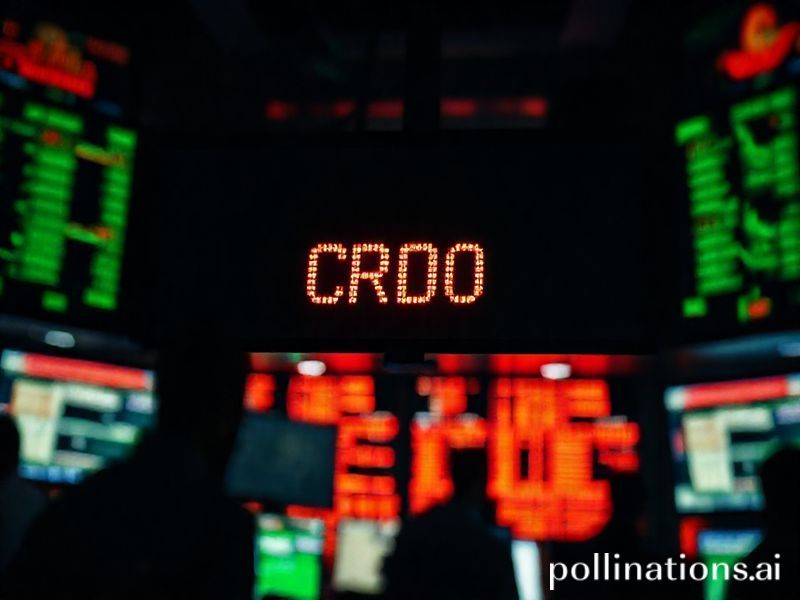crdo stock
CRDO: The Tiny Semiconductor Stock Quietly Holding the Global Economy Together—Until It Doesn’t
By the time most citizens of Earth have finished their first cup of overpriced coffee, the share price of Credo Technology Group Holding Ltd (NASDAQ: CRDO) has already bounced around like a diplomatic cable in a shredder. Based in San Jose—Silicon Valley’s answer to a gated community for engineers who failed charm school—Credo makes high-speed serial-interface chips. Translation: the microscopic traffic cops that tell data where to go inside everything from AI accelerators to undersea cables. If the internet were a nervous system, CRDO would be the synapses—small, overlooked, and absolutely catastrophic when they misfire.
Globally, CRDO has become the canary in the geopolitical coal mine. The company’s fortunes swing on decisions made in drab conference rooms in Washington, Beijing, and Brussels—places where coffee is terrible and the future is bartered in PowerPoint. When the Biden administration tightened export controls on advanced semiconductors last October, CRDO tumbled 12 % overnight. Not because it sells directly to Huawei, but because investors suddenly remembered that supply chains are like marriages: one ugly argument and everyone’s sleeping on the couch. Meanwhile, in Taipei, TSMC quietly continued ordering CRDO’s retimer chips for its bleeding-edge CoWoS packaging, proving once again that geopolitics stops for no one—except maybe a purchase order.
The stock’s rally this spring—up 67 % from March lows—owes less to dazzling earnings (revenue beat by a rounding error) and more to the collective panic of data-center operators who realized that the AI boom needs more bandwidth than a teenager’s Wi-Fi. Hyperscalers in Northern Virginia, under the bored gaze of rent-a-cops who’ve seen everything except hope, now measure latency like cardiac surgeons. CRDO’s 112G SerDes IP has become the Kleenex of data movement: everyone uses it, nobody can spell it. Naturally, hedge funds in Mayfair have piled in, because nothing screams “risk management” like a $3 billion firm whose quarterly report features the phrase “cyclical demand headwinds” next to a smiling cartoon signal integrity mascot.
From Lagos to Lahore, the ripple effects are deliciously absurd. Nigerian fintech startups, sustained by AWS credits and sheer audacity, rely on the same chips CRDO ships to Meta’s Arctic-circle server bunkers. When CRDO sneezes, someone’s buy-now-pay-later app in Jakarta catches pneumonia. And because the stock trades at 17-times forward sales—a multiple that makes even dating apps blush—any rumor of a down-tick is met with the sort of hysteria usually reserved for royal weddings or nuclear tests. Last week, a single tweet from a Japanese day-trader using a Sailor Moon avatar sent the shares limit-down in Frankfurt. Somewhere in Davos, a central banker spilled his matcha.
Yet the broader significance is darker. CRDO’s valuation is a referendum on humanity’s ability to keep stuffing exponentially more data into the same tired planet. Every bullish note from a Wall Street analyst is, in effect, betting that we’ll continue generating selfies, deepfakes, and algorithmic cat videos until the oceans boil. Bears counter that physics is non-negotiable: electrons get hot, copper melts, and eventually the cloud is just weather. In that light, the stock’s daily gyrations aren’t about credo; they’re about creed—our secular faith that tomorrow’s problems can always be monetized today.
At the closing bell, CRDO ticked up another 2.4 % on no news whatsoever, proving once again that markets are efficient only at turning caffeine into volatility. Traders high-fived over Slack; ESG analysts drafted memos about Scope 3 emissions; and somewhere in Shenzhen, a factory foreman scheduled overtime to meet demand that may evaporate with the next sanctions list. The world spins, packets fly, and the tiny company that keeps the data deluge from drowning us all edges higher—until, of course, it doesn’t.







